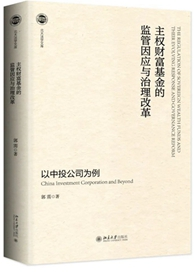Two Scientific Research Achievements of the School Won the Fifth Chinese Law Outstanding Achievement Award
Date:2023-12-08
Recently, the "Fifth China Law Outstanding Achievement Award" organized by China Law Society was announced. Mr. Chen Ruihua's paper "Compliance Incentive Model in Criminal Proceedings" from Peking University Law School won the third prize, and Mr. Guo Li's book "Regulatory Consequences and Governance Reform of Sovereign Wealth Funds" won the first prize.
Ms. Chen Ruihua's award-winning paper "Compliance Incentive Models in Criminal Proceedings" was published in China Law Journal, Issue 6, 2020. The abstract of the paper is as follows: Based on the consideration of strengthening special protection for private enterprises, China's procuratorial authorities have initiated the reform exploration of the compliance non-prosecution system. From the perspective of the path of compliance introduced into the public prosecution system, compliance non-prosecution has the mode of prosecutorial recommendation and the mode of conditional non-prosecution. From the viewpoint of the incentive effect of effective compliance, these two modes have their own advantages and disadvantages, but it is possible to become two parallel criminal compliance mechanism. Compliance with the exploration of the system of non-prosecution, not only with the protection of private enterprises policy considerations, but also with the transformation of the private enterprise business model, decriminalization reform considerations, and ultimately achieve the positive effect of reducing and preventing the crime of private enterprises, play a positive role in the participation of procuratorate in the governance of society. At present, the non-prosecution compliance system is in the exploratory stage, and the procuratorial organs around the world have carried out a lot of system innovations, but also facing many aspects of the system dilemmas and practical problems. The implementation of the non-prosecution compliance system means that a cooperative judicial model centered on compliance incentives has begun to emerge in China's criminal proceedings, which will have a far-reaching impact on the development of criminal procedure theory.
Mr. Guo Li's award-winning book, Regulatory Responses and Governance Reform of Sovereign Wealth Funds, was published by Peking University Press in May 2019, and was selected as one of the "Peking University Law Libraries". Starting from the increasingly prosperous field of sovereign wealth funds, the book proposes to realize the goal of global synergistic governance through the construction of a new type of "international rule of law", providing a good choice for readers who want to understand sovereign wealth funds and international financial activities. This monograph focuses on the legal issues affecting the operation of sovereign wealth funds from two dimensions. The first is the regulatory posture of host countries with respect to sovereign wealth funds. The book examines the adjustments and changes in the relevant policies of developed countries such as the United States and Europe and their impacts, and discusses the responses of the world's major sovereign wealth funds to these changes. Secondly, the book discusses how sovereign wealth funds can reform themselves to improve their governance structure and enhance their governance level. The author explains the relative specificity of sovereign wealth funds as investment subjects under the conditions of market economy, especially analyzes their impact on the existing legal framework of companies and the international investment environment, and puts forward suggestions for the operation and development of CIC. The book was awarded the "Anzuke International Trade Research Award" for outstanding publications.

The "China Law Outstanding Achievement Award" is a ministerial-level scientific research award set up by the China Law Society with the consent of the Central Committee of the Communist Party of China and the State Council, and is also the highest academic achievement award organized and selected by the China Law Society.
Translated by: Yan Xiaoshuang
Edited by: Chen Hong



